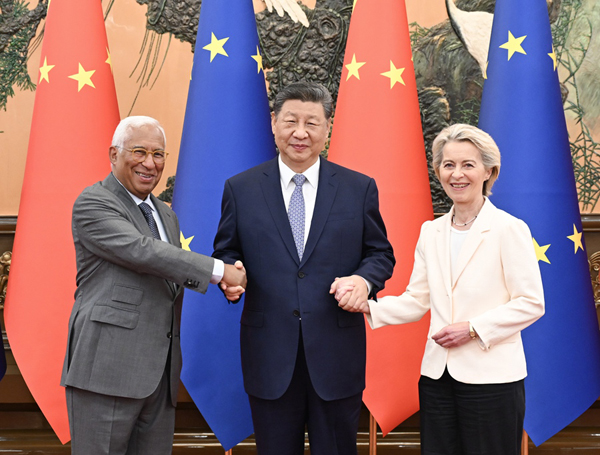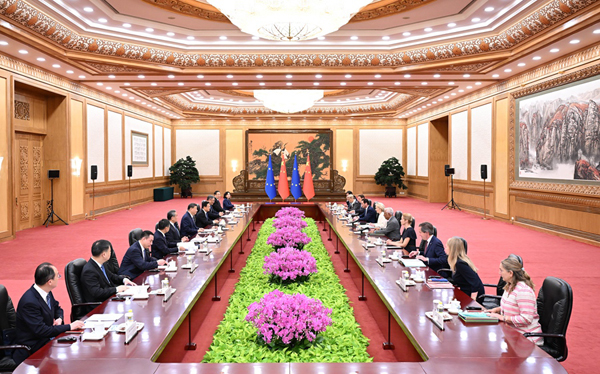
People’s Republic of China


On the morning of July 24, 2025, President Xi Jinping met with President of the European Council António Costa and President of the European Commission Ursula von der Leyen, who are in China for the 25th China-EU Summit, at the Great Hall of the People in Beijing.
Xi Jinping noted that over the past 50 years, China and the EU have achieved fruitful outcomes in exchanges and cooperation, delivering mutual success and worldwide benefits. An important understanding and insight is that the two sides should respect each other, seek commonality while reserving differences, uphold openness and cooperation, and pursue mutual benefit. These are also important principles and the right direction for China-EU relations in the future. Noting that this year marks the 50th anniversary of the establishment of China-EU diplomatic relations and the 80th anniversary of the founding of the United Nations, Xi Jinping said that China-EU relations have come to another critical juncture in history. China and the EU are both constructive forces for multilateralism and openness and cooperation. The more challenging and complex the international situation becomes, the more China and the EU need to strengthen communication, enhance mutual trust, and deepen cooperation. Faced with accelerating global transformation not seen in a century and a changing and turbulent world, Chinese and EU leaders should once again demonstrate vision and leadership, make the right strategic choices that will meet people’s expectations and stand the scrutiny of history, steer the right course for the development of China-EU relations, and work to open a brighter next 50 years for China-EU relations, contributing more stability and certainty to the world.
Xi Jinping put forward three proposals for advancing China-EU relations. First, upholding mutual respect to reinforce the China-EU partnership. China is a peace-loving country that values harmony, inclusiveness, cooperation, and win-win outcomes. Measuring China against the path taken by Western countries would result in a biased understanding of China. While China and Europe differ in history, culture, path, system, and development stage, such differences have not impeded the establishment of China-EU diplomatic relations and growth of bilateral relations in the past, nor should they obstruct the development of bilateral relations in the future. The challenges currently faced by Europe do not come from China. There are no fundamental conflicts of interest or geopolitical contradictions between China and the EU; and the fundamentals and prevailing trend of cooperation outweighing competition and consensus outweighing differences remain unchanged. China has always viewed and developed relations with Europe from a strategic and long-term perspective, regards Europe as an important pole in a multipolar world, and has consistently supported European integration and the EU's strategic autonomy. Xi Jinping expressed the hope that the EU will also respect the path and system chosen by the Chinese people, respect China's core interests and major concerns, and support China's development and prosperity. The China-EU relationship is not targeted at any third party, nor is it subjugated to or controlled by any third party. The two sides should deepen strategic communication, enhance understanding and mutual trust, and foster the right perception of each other.
Second, upholding openness and cooperation to manage differences and frictions. History and reality have proven that interdependence is not a risk, and convergent interests are not a threat. Boosting competitiveness should not rely on "building walls and barriers", and "decoupling and severing supply chains" will only result in self-isolation. Reducing dependency does not mean reducing cooperation. The essence of China-EU economic and trade relations lies in complementarity and mutual benefit, and dynamic equilibrium should and can be achieved through development. China's high-quality development and high-standard opening up will provide new opportunities and expand new space for China-EU cooperation. China and the EU should deepen green and digital partnerships and promote mutual investment and cooperation. Xi Jinping expressed the hope that the EU will keep its trade and investment markets open, exercise restraint in using restrictive economic and trade tools, and foster a sound business environment for Chinese enterprises investing and doing business in Europe.
Third, upholding multilateralism to safeguard international rules and order. Confronted with major choices between war and peace, competition and cooperation, and closure and openness, multilateralism, solidarity and cooperation are the right answers. China and the EU should jointly uphold the international rules and order established after the end of World War II, advance the building of a more just and equitable global governance system in keeping with the times, and work together to address climate change and other global challenges, so that the torch of multilateralism will illuminate the way forward for humanity. China and the EU should support the peaceful settlement of international disputes through political means. China always decides its position based on the merits of the matter, stands for peace talks, and advocates addressing both symptoms and root causes. China is ready to strengthen coordination with the EU to ensure the success of the UN Climate Change Conference in Belém this year and make greater contributions to climate change response and global green transition. China is also ready to conduct policy communication and practical cooperation with the EU in the field of artificial intelligence and jointly promote an equal and orderly multipolar world and universally beneficial and inclusive economic globalization.
The EU leaders stated that President Xi Jinping's three proposals on EU-China relations are of great importance. Over the past 50 years since the establishment of diplomatic relations, the EU and China have carried out cooperation in a wide range of fields, with constantly growing scope and depth. The two sides have become important cooperation and trade partners for each other, contributing to their respective economic prosperity and improving the well-being of their peoples. China has become a major country in manufacturing and science and technology, and has lifted hundreds of millions of people out of poverty. China's development has impressed the world and provided important inspiration for the world. The EU believes in and supports China's greater development. Both the EU and China are significant forces in the world, and the EU-China relations are of vital importance to both sides and the world. The EU is committed to deepening relations with China, handling differences in a constructive manner, and promoting bilateral cooperation on the basis of equilibrium, reciprocity, and mutual benefit to continue achieving more positive outcomes. The EU does not seek "decoupling and severing supply chains" from China and welcomes Chinese enterprises to invest and do business in Europe. Facing a turbulent world full of uncertainties, the EU and China should shoulder responsibilities together, jointly uphold multilateralism, safeguard the purposes and principles of the UN Charter, work together to address global challenges such as climate change, promote solutions to regional hotspot issues, and maintain world peace and stability. The EU looks forward to working with China to continue writing a more brilliant chapter in the next 50 years of EU-China relations.
Wang Yi attended the meeting.




